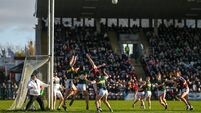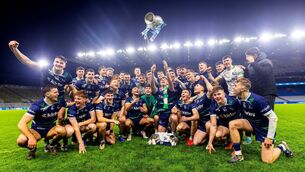Tidal second-half surge a rallying cry for years to come in Waterford

DEISE FRENZY: Waterford manager Liam Cahill in frenzied celebration as Kilkenny's Conor Fogarty gets hooshed out over the sideline minute by Darragh Lyons, Jack Fagan, and Austin Gleeson. It recalled similar moments over the last two decades when men in a black and amber jersey were doing bouncer duty where the sideline was concerned. : Daire Brennan, Sportsfile
Certain games burn themselves into a county’s psyche, memories to be recalled when the sinews need stiffening.
That was Saturday night for Waterford. At half-time in the All-Ireland semi-final, they weren’t adrift. They were marooned. Mistakes and misses, goals leaked and points gifted meant Kilkenny were seven up at the break, having led by nine at one stage in the first half.











